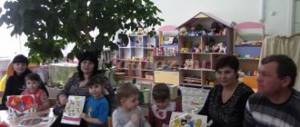Municipal educational institution "Boarding School No. 10 of the city of Donetsk"
Today, the family performs not only traditional functions related to the birth and raising of a child and solving everyday problems, but also plays a large role in reliable psychological protection for the purpose of human survival in the difficult and rapidly changing conditions of modern society.
Tolerance is not unanimity, not universal agreement. You cannot force people to think the same, believe the same, work the same, relax the same. There should be general agreement on one thing - that we should all respect each other. This is as necessary in a civil society as is universal respect for the law. In other words, tolerance is following the “golden rule”: treat other people the way you want to be treated. If you wish only good things for yourself, then you need to wish good things for others.
If you are concerned about your child’s behavior, if you are alarmed or outraged, do not rush to punish him or threaten him with punishment. Try to understand what is happening to him. Remember other cases, analyze your relationship with him. Don’t be afraid to ask yourself direct questions: where are our mistakes? what is our fault?
Parents must understand that a child is not a small adult. He cannot put everything into words, and expresses a lot in his own language. When a baby cries, the mother, as a rule, looks for the cause of the crying: wet diapers, a stomach ache. And if a five-year-old is capricious and fights, there is often a different reaction – anger, although the “brawler” also says: I feel bad, I ask you for help.
But adults most often do not hear this, they “read” his behavior in their own way (he broke the rules, went overboard) and instead of help, they shout: “You are worthless, I am angry with you!” If this affects the personality of the parent, it means that there are unanswered questions inside him, questions from which he is running away. And for parents there is a discovery: the child is not expressing his attitude towards them, he is talking about himself, but he cannot convey his state in words. His behavior is to help his parents. If they begin to understand this, it is easier for them to cope with the situation without anger or punishment.
What can you say to a child who demands attention, pesters, is capricious, or stomps his feet? There is no need to say anything. Play with him. Lie down on the carpet, roll around, wrestle. Give him the opportunity to show his maximum strength.
When a parent allows a child to be who he is, he himself is free to express his feelings. The degree of internal freedom increases, and then completely different relationships arise - sympathetic ones, based on mutual affection, mutual enrichment.
What can you do to bond with your child? Maybe you're too busy? You can change some circumstances, but you must help children adapt to others. The purpose of education is to encourage children to want to obey you. Once you establish a connection with your child, he will probably want to please you.
There are “better” times in every child’s behavior. Take advantage of this. Be especially friendly and involved when your child shows what he can do. Emphasize that you are happy with him. The child will learn that he is happier when he behaves well and makes his parents happy.
Create a favorable atmosphere in your home: praise its virtues more than condemn its shortcomings. Children need to hear, day after day, from morning to evening: “Yes”, “Wonderful!”, “Thank you”, “Great job!”, “Bravo!”
Set your child up for success. Offer things that can be done playfully. Give him responsibility for something. A child who is accustomed to being responsible for certain things is more likely to learn to be responsible for his behavior.
Give up any parenting methods that do not produce results, as well as those that cause conflicts. Don't grumble. This discourages children from doing what they are asked to do. Spanking will only make an already irritated child even more angry. The best parenting methods will also not produce results unless you create an environment conducive to good behavior in your child. Make sure your child has no doubt that you are the adult in charge who can be trusted. Inspire your child: “I love you, and therefore I will help you manage yourself.”
Correct unwanted behavior. Offer your child activities that will soften his impulsiveness. Determine the time of day when your child tends to be at his worst (often late afternoon), play soothing music, and give him a relaxing massage.
Introduce prohibition and encouragement. Prohibit hitting and encourage replacement action. When you ask your child to stop fighting, provide him with something to physically relax (a ball, a pillow to hit). Teach your child to use speech instead of giving free rein to his hands: “This makes me angry. I do not like it".
Tell your child what behavior you expect from him. Try to introduce a parenting regime without any “no”. Instead of telling your child what not to do, offer constructive substitutes. Instead of saying, “Don't abandon your truck,” say, “Put your truck on the shelf over there.” Show me how to do it. If the boy continues to throw the truck, tell him that toys are there to be played with and that you want him to play with the toys. If he throws them, then the toys will be removed. (And calmly do as you say if the child persists in bad behavior). When correcting your child's behavior, teach him to concentrate. Tell him, “Look me in the eyes,” and gently place your hands on his shoulder and make eye contact with him, don’t threaten, don’t forcefully restrain him, just help him pay attention to your demands.
Explain to your child that your alliance with him is aimed at shaping his behavior: “We will cooperate so that we enjoy living together.”
Also explain the relationship between cause and effect. “When you are friendly, playing with friends, I am happy, and you can continue playing. When you fight with your comrades, then you have to stop playing.” Thus, the child knows in advance about the consequences of his behavior.
Stop bad behavior and correct it before the child moves in an undesirable direction. Distract the child and redirect his attention towards the desired actions: “You can’t climb on the kitchen table, but you can climb on the sofa or in dad’s arms.” Remind them, “You're starting to worry me,” or “You're getting too excited,” and then introduce a short break to help your child gain control. Gradually he will learn to respond to your words.
Encourage and reward good behavior and you will find that you are raising a child that you truly enjoy and that makes you proud. More importantly, your child will be proud of themselves too.




